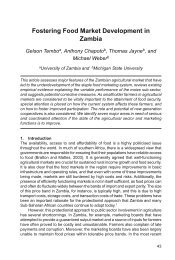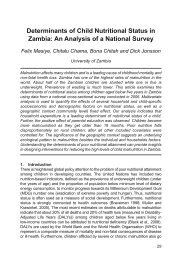Introduction to Basic Legal Citation - access-to-law home
Introduction to Basic Legal Citation - access-to-law home
Introduction to Basic Legal Citation - access-to-law home
You also want an ePaper? Increase the reach of your titles
YUMPU automatically turns print PDFs into web optimized ePapers that Google loves.
After publication in Pacific Reporter:<br />
Smith v. Jones, 1999 UT 16, 21, 998 P.2d 250.<br />
Smith v. Jones, 1999 UT App 16, 21, 998 P.2d 250.<br />
If the immediately preceding authority is a post-January 1, 1999, opinion, cite <strong>to</strong> the<br />
paragraph number:<br />
Id. at 15.<br />
Vermont: Supreme Court citation practice | <strong>Citation</strong> rule(s)<br />
Examples from Morin v. Essex Optical, 2005 VT 15, 868 A.2d 729<br />
. . . .<br />
242<br />
Contents | Index | Help | < | ><br />
3. At the time of injury, claimant's average weekly wage was $ 475, and her resulting weekly<br />
workers' compensation benefit was $ 317. During the period between her injury and the<br />
Commissioner's compensation decision, she received a cost of living adjustment <strong>to</strong> her<br />
temporary benefits every July 1 as mandated by 21 V.S.A. § 650(d). As a result, she was<br />
receiving weekly compensation of $ 469 from July 1, 2001 through June 30, 2002. In July<br />
2002, the annual cost of living adjustment would have increased her benefit <strong>to</strong> $ 489, an<br />
amount in excess of her $ 475 average weekly wage at the time of her injury. Defendant's<br />
insurance carrier refused <strong>to</strong> increase claimant's benefit. Claimant submitted the question <strong>to</strong> the<br />
Commissioner in a motion for summary judgment, arguing that she was entitled <strong>to</strong><br />
continuedyearly increases under 21 V.S.A. § 650(d) irrespective of whether her benefit<br />
amount exceeded her average weekly wage at the time of her injury. The Commissioner<br />
denied the motion, and claimant appealed. On appeal, the Commissioner submitted the<br />
following certified question: "Did the Department of Labor and Industry err in its<br />
interpretation of 21 V.S.A. § 650(d) in concluding that a permanent <strong>to</strong>tal disability claimant's<br />
weekly compensation rate could not exceed her average weekly wage?" We answer this<br />
question in the affirmative.<br />
4. This appeal involves a question of <strong>law</strong>, and "if the Commissioner's conclusions are<br />
supported by the findings and reflect the correct interpretation of the <strong>law</strong>, we will affirm the<br />
Commissioner's decision." Butler v. Huttig Bldg. Prods., 2003 VT 48, 9, 175 Vt. 323, 830<br />
A.2d 44. Further, we will defer <strong>to</strong> the Commissioner's construction of the Workers'<br />
Compensation Act, "absent a compelling indication of error." Wood v. Fletcher Allen Health<br />
Care, 169 Vt. 419, 422, 739 A.2d 1201, 1204 (1999). Even under our deferential standard, we<br />
conclude that the Commissioner's decision in this case is not supported by the findings and<br />
reflects an unjust and unreasonable interpretation of the <strong>law</strong>. See Clodgo v. Rentavision, Inc.,<br />
166 Vt. 548, 550, 701 A.2d 1044, 1045 (1997) (noting that we will not affirm an unjust<br />
interpretation).<br />
. . . .




